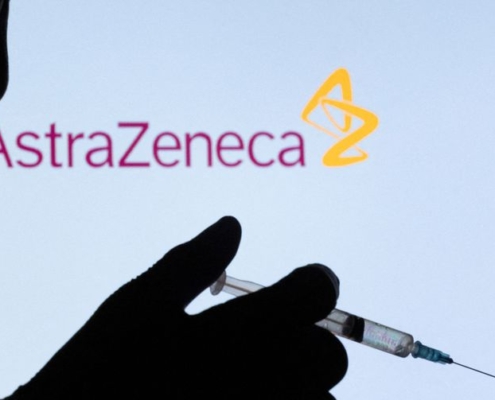AstraZeneca goes for growth with new drugs as COVID sales wane
AstraZeneca goes for growth with new drugs as COVID sales wane
By Natalie Grover and Maggie Fick
LONDON, Feb 9 (Reuters) – AstraZeneca (AZN.L) on Thursday forecast growth in 2023 earnings and revenue as the British drugmaker seeks to offset declining sales of COVID-19 medicines with its cancer, metabolic and rare disease drugs.
Its shares rose 5% to be the second-best performer on London’s blue-chip FTSE 100 (.FTSE) index in early trade, on track for their best day in a year.
CEO Pascal Soriot said the firm was on a path to deliver at least 15 new medicines this decade. The company also predicted a return to growth in China, one of its key markets, after reporting a second consecutive quarter of growth even as prices remain under pressure.
“Based on our progress in developing our existing and new medicines, we move into 2023 very much on track to deliver our industry-leading growth ambitions for 2025, but also beyond until 2030,” Soriot told a news briefing.
The 2023 guidance helped allay some analysts’ concerns that profits would be eroded by higher expenses as the company prepares for a flurry of clinical trials and drug launches.
“We think that given the concerns around margins going into results, we think this result/guide is good,” Barclays analyst Emily Field said, noting the earnings guidance was at the higher end of her expectations.
Adjusted earnings per share in 2023 is expected to grow by a “high single digit to low double-digit percentage”, and revenue to increase by a “low-to-mid single-digit percentage”, at constant currency rates.
Revenue excluding COVID-19 medicines is expected to increase by a low double-digit percentage.
The company said core operating expenses this year would increase by a low-to-mid single-digit percentage.
The drugmaker also reported better-than-expected fourth-quarter profit, and revenue just shy of company-compiled analyst estimates.
Sales of its best-selling cancer drugs — Tagrisso, Imfinzi and Lynparza — came in just below estimates from Cowen analysts.
Other key medicines, including rare blood disorder drug Soliris and Ultomiris that came with its $39 billion acquisition in 2021 of Alexion, also brought in sales just below Cowen estimates.
Fourth-quarter revenue was hurt by a decline in sales of COVID-19 vaccine Vaxzevria.
The company’s sales in China last year were hurt by lower drug prices while COVID lockdown measures, before the country’s recent abandonment of its zero-COVID policy, have kept some patients from being diagnosed and seeking care.
Sales started to pick up in the second half of 2022 and in the fourth quarter grew by 3% at constant currency rates.
Margins
AstraZeneca shares have outperformed rivals in recent years, gaining 41% since January 2020 due to its success in oncology.
Its shares also rallied during the first few years of the pandemic after it developed a COVID vaccine with Oxford University. Sales have waned though as shots made by Pfizer (PFE.N) and Moderna (MRNA.O) have dominated the market.
Of key interest to investors is the experimental cancer drug, datopotamab deruxtecan, being evaluated in a keenly anticipated late-stage trial involving lung cancer patients.
Partner Daiichi Sankyo (4568.T) this month said results of that study have been delayed to the second quarter from the first quarter of 2023.
AstraZeneca’s long-serving boss told a media briefing that he is not planning to step down as CEO anytime soon, though there are “several potential successors” the board has in mind.
Our Standards: The Thomson Reuters Trust Principles.
Source: Reuters











